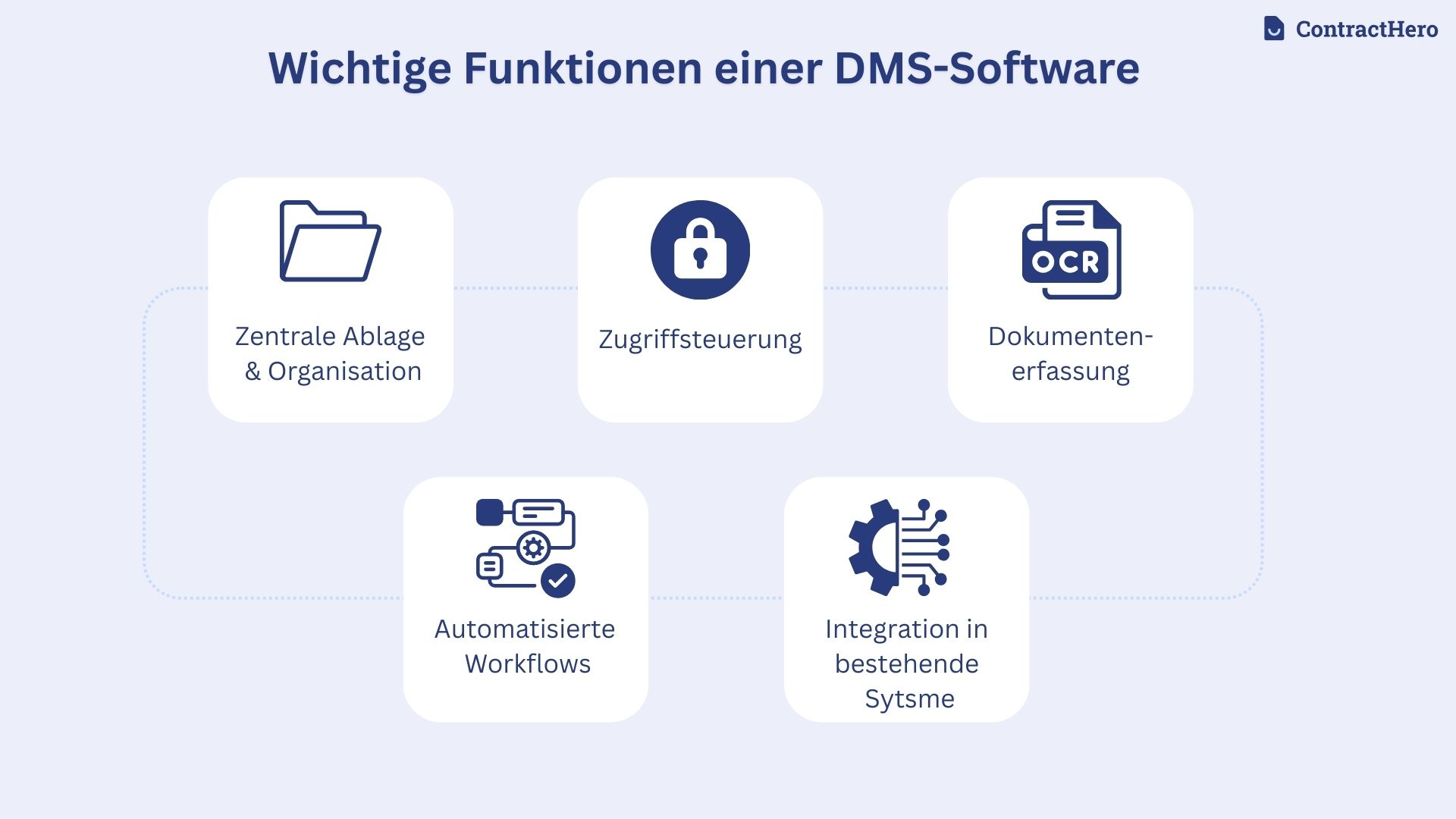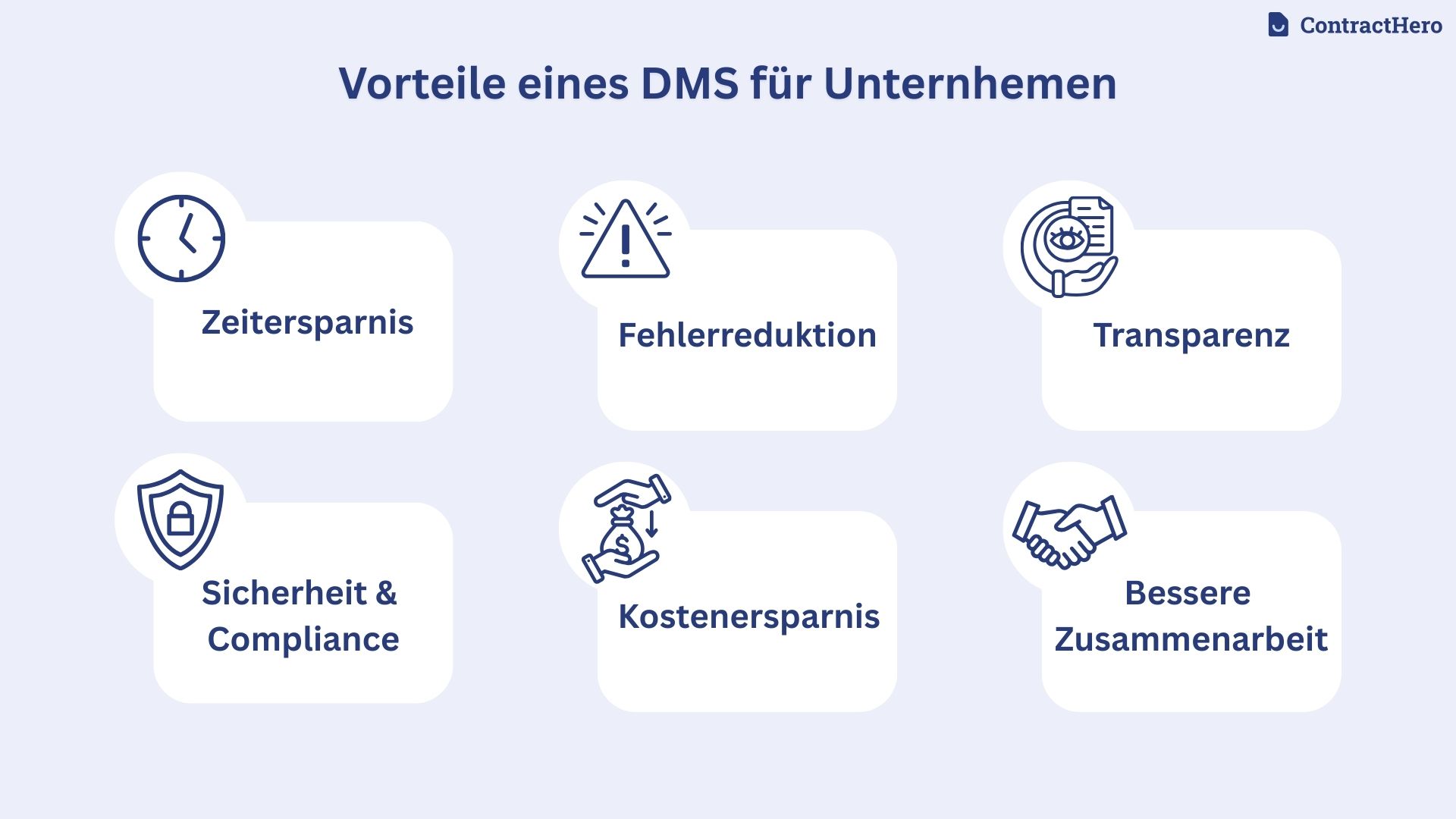
Whether contracts, invoices, emails or internal logs - companies produce large volumes of documents every day. Without a structured solution, this can quickly become confusing. This glossary article shows how document management software can provide support here and what specific added value it offers companies.
A document management system (DMS) is a central digital solution for the structured management of company documents throughout their entire life cycle. It combines crucial core functions such as capturing, storing, managing, archiving and audit-proof deletion of documents in one system. This can help to transform the traditional, often paper-based management of documents into an efficient digital information flow within the company. Companies can thus significantly optimize their processes and save valuable resources.
A central function of a document management system is the enrichment of each document with additional information, so-called metadata - for example the creation date, a project number, the processing status or the responsible team member. This makes it easier to systematically organize, quickly find and seamlessly track relevant content. This creates a clear structure that makes day-to-day work much easier. In addition, a DMS ideally helps to ensure that the highest security and compliance requirements are reliably met for sensitive or personal information. This is particularly essential for companies in process- and contract-heavy industries in order to ensure secure and legally compliant document management.
Factors such as company growth or increasing project numbers inevitably lead to an increasing volume of invoices, contracts and internal documents. Without a clear management system, things can quickly become chaotic: Important documents disappear into cluttered email inboxes or scattered folders, making access difficult and leading to inefficiencies. This not only costs time, but also increases the risk of errors and missed deadlines.
A DMS can help here by providing order, security and fast, centralized access to all important files. It automates recurring processes, reduces manual effort and thus creates more efficiency in day-to-day work. Thanks to central storage and improved accessibility, documents can not only be found quickly but also processed securely, which significantly improves collaboration within teams. In view of growing data volumes and increasing regulatory requirements, a DMS is becoming a strategic tool for companies that want to sustainably improve transparency, governance and efficiency.
A modern document management system (DMS) offers a wide range of features that go far beyond simple digital filing. The essential functions include
Central document management and document organization:
All documents are stored in one structured location. Different versions of a document can be managed and changes can be tracked. Content can be efficiently organized using metadata and quickly retrieved using the search function. Whether in the cloud or on your own servers, a DMS offers flexibility and control when dealing with digital documents.
Access control:
Roles and rights are assigned to precisely control who can access, edit or release which documents. This protects sensitive content and ensures clear responsibilities.
Document capture:
Documents are brought into the system via upload or e-mail. With the help of OCR (Optical Character Recognition) technology, the DMS recognizes text content from scanned documents and converts it into searchable data. AI-supported systems automatically extract relevant information such as amounts or contract details, store appropriate metadata and thus enable faster further processing and targeted evaluation.
Automated workflows:
A DMS automates recurring processes such as approvals or checks by assigning tasks, monitoring deadlines and controlling all steps centrally.

A powerful DMS unfolds its full added value when it integrates seamlessly into the existing IT landscape and optimally complements existing systems. In sales, this often includes CRM solutions such as Salesforce, while ERP systems play a central role in production and administration. A well-coordinated DMS integration ensures that information is available across systems and flows smoothly.
The DMS automatically exchanges data with other applications via interfaces such as APIs (Application Programming Interfaces) or webhooks (real-time data transfer between applications). For example, an incoming invoice can be linked directly to financial accounting or an approved contract document can be transferred to CRM. Standardized integrations - for Microsoft 365, Outlook or DATEV, for example - simplify this process as they standardize data exchange, speed up implementation and reduce compatibility issues.
Typical connection options:
Successful DMS integration not only improves the flow of information, but also collaboration across several departments.
A document management system is able to manage a large number of documents, such as invoices, contracts, quotations, delivery bills, emails, letters, applications, minutes, forms, presentations and videos or audio files. In general, all types of business documents that have been digitized or are already available in digital form can be stored and organized in a DMS. Depending on the type of media, documents enter the system in different ways. Digital files can usually be transferred directly. Paper documents must first be scanned and read using text recognition (OCR) to make the content machine-readable and searchable. Ideally, the captured data is automatically classified and correctly assigned to the relevant contract, project or business case.
A DMS offers clear advantages in all areas of information processing. Central storage combined with targeted indexing ensures that documents can be found quickly. This shortens search times and speeds up decision-making processes. At the same time, manual intermediate steps such as filing in different systems or sending by e-mail are eliminated. The result is a standardized, clearly structured document base that reduces sources of error and ensures greater transparency in day-to-day work
Another advantage is process automation: recurring tasks such as approvals, checks or archiving can be mapped using workflows. This ensures clear processes, seamless tracking and noticeably reduces the workload for everyone involved.
A DMS is also impressive when it comes to security: access rights can be controlled based on roles so that sensitive content is only accessible to authorized persons. At the same time, audit-proof logging ensures transparency and supports compliance with legal requirements, particularly with regard to data protection requirements such as the GDPR.
Last but not least, a DMS helps to reduce costs: Digitization replaces paper-based filing, reduces printing costs and enables optimized use of information thanks to AI-supported text recognition. This creates structured processes, reduces sources of error and gives companies back control over their documents.

Whether in industry, services or administration - document management systems ensure efficiency wherever structured access to documents is required. The following is an overview of the most important fields of application:
Finance and accounting
Invoices, receipts and proof of payment are recorded digitally and archived in an audit-proof manner. Automated workflows ensure fast invoice verification and approval.
Human Resources (HR)
Applications, employment contracts, absences and salary documents can be managed centrally. Onboarding processes, feedback meetings and training certificates can also be mapped in a structured manner.
Sales and marketing
Quotations, orders, campaign documentation and presentations are stored centrally and clearly. Customer communication is documented in a traceable manner and approvals are automated.
Purchasing and supplier management
Inquiries, orders and contract documents are stored centrally. Recurring processes such as order approvals can be automated and made traceable.
Law, law firms and authorities
Digital files, contracts and deadlines can be managed securely. Data protection and archiving requirements are reliably met at all times.
Thanks to flexible configuration, a DMS can be adapted to the individual requirements of any industry - from medium-sized companies to complex corporate structures.
Even small companies benefit from structured digital document management. Modern DMS solutions can be used flexibly and can be tailored precisely to the requirements of smaller or growing companies - without compromising on functionality. Whether and when the introduction of a DMS is worthwhile depends on the specific requirements. For many small companies, it makes sense to use it if they regularly work with sensitive data, contracts or invoices. In other cases, the purchase may initially seem too extensive - for example, if the volume of documents is still manageable or there are no clear processes. Nevertheless, an early start often makes sense, as processes can be set up properly from the outset and subsequent changes are much easier.
However, one thing is certain: those who digitize early on lay the foundation for structured processes, save time in administration and create room for growth.
Wire's success story in the area of contract management provides an illustrative example. Before the introduction of ContractHero, contracts were spread across various platforms, sometimes even in private folders. This led to long search times and a lack of overview of deadlines and content. With ContractHero, all contracts could be centrally bundled and automatically indexed. Functions such as full-text search and automatic recognition of important details, such as terms or notice periods, now ensure transparency and planning security.
This example shows how digital systems offer added value not only in contract management, but also in other areas: In finance, invoices can be archived in an audit-proof manner, in human resources, application and employee documents can be managed in a structured manner and in purchasing, contracts with suppliers can be managed efficiently. What all scenarios have in common is that the documents are centrally available, access is clearly regulated and processes are much simpler.
A document management system secures confidential data when it is passed on within the company and protects it from unauthorized access. It ensures compliance with legal requirements and supports the traceability of all processing steps. A secure system is indispensable, especially when dealing with confidential data such as contracts, personnel files or customer data.
Relevant legal principles include the GoBD, which prescribes the audit-proof, unalterable archiving of tax-relevant documents, and the GDPR, which regulates the handling of personal data. A DMS fulfills these requirements through access controls, logging of all changes and defined deletion periods.
In addition, a DMS must also take industry-specific requirements into account, for example in the healthcare or finance sectors. Some requirements are legally binding - for example, the obligation to process invoices electronically in the public sector. The accessibility of digital content is also mandatory in certain areas, for example for public administrations, universities or providers of banking and insurance services if they provide digital services for the general public. In other areas, accessibility is not mandatory, but can offer significant added value as a voluntary measure, for example through accessible PDF documents or optimized accessibility for all user groups.
Choosing the right DMS is a strategically important step for companies. There is no such thing as a standard solution. It is crucial that the system fits existing processes, technical requirements and future growth targets.
Important selection criteria are an intuitive user interface, flexible adaptability and legally compliant archiving. Integration into existing systems such as ERP, CRM or accounting solutions should also be possible without any problems.
In addition, the DMS software used must meet the highest security standards. In addition to protection against unauthorized external access, this also includes differentiated authorization concepts within the company.
The easier a DMS is to use, the greater its acceptance in everyday working life. When documents reach the right place quickly and without detours, the workflow improves and employees are noticeably relieved.
In addition, the chosen software should be scalable and supported by a provider with reliable service. Only if the system can be adapted to changing company structures and competent support is available for technical questions, problems or training will it remain a reliable part of the digital working environment in the long term.
The right DMS solution should reliably fulfill current requirements and at the same time be flexibly prepared for future growth.
A modern document management system is indispensable for companies of all sizes. It replaces time-consuming, error-prone processes with centralized, secure and structured administration. Thanks to automated processes, clear access rights and high security standards, a DMS increases efficiency and transparency and creates space for strategic tasks.
ContractHero offers a holistic solution for the digital management, monitoring and processing of contracts. With German server security, ISO certification, AI-supported document capture and automated deadline monitoring, companies maintain an overview at all times. Flexible user roles, intelligent search functions and seamless integrations ensure that contract management is not only used digitally, but also strategically - for greater transparency, planning security and more productive processes.